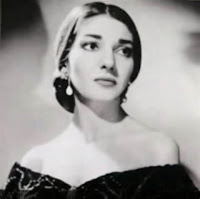 | |
| Renata Scotto as Elena in I Vespri Siciliani |
I'm continuing to listen to one Verdi opera a day, not on consecutive days but in
order, in partial celebration of the Verdi Bicentennial. I'm also making use of Mary Jane Philips Matz's magisterial biography of the composer, along with books by Julian Budden and Francis Toye. Mostly I'm just listening for my own enjoyment, as I hope my comments reflect
 |
| Maria Callas in La Traviata |
Inspired by the courtesan Marie DuPlessis (1824-1847)
Maria Callas, Giuseppe DiStefano, Ettore Bastianini/Carlo Maria Giulini La Scala 1955
La traviata is an easy opera to take for granted. The story had notoriety before Verdi/Piave got to it, mostly via Sarah Bernhardt and Eleanora Duse. What begins in a brittle and cynical manner becomes an exercise in sincerity that dares you to mock. Violetta may be to sopranos as Hamlet is to actors. Again, Verdi is a great tune smith
We go from hedonism to pathos to deeply moving drama
The role of Alfredo is misleading. He has less to do emotionally in the opera. The heart of the piece is the Violetta-Germont scene in Act II. But Alfredo is no easy sing. He's worth doing for the Act III scene at Flora's if for nothing else
Don't miss the new biography of Marie DuPlessis, whose life inspired Dumas fils and Verdi
The Girl Who Loved Camellias by Julie Kavanaugh
Les vepres Siciliennes Eugene Scribe/Charles Duveyrier Paris 1855
Alexandrina Pendatchanska, Gregory Kunde, Dario Solari, Orlin Anastassov/Gianluigi Gelmetti Naples 2011
I vespri Siciliani Ettore Ciami Perugia 1855
Renata Scotto, Placido Domingo, Sherrill Milnes, Paul Plishka/James Levine
Metropolitan Opera November 4, 1974
These are two different operas with the same music and plot. Verdi wrote a French opera, to a French text for the Paris Opera.
In Verdi's day opera was sung in the language of the audience, thus necessitating an Italian translation, which
 |
| Salle Le Pelletier, Paris c. 1850 |
Verdi knew that the Italian Vespri would run afoul of the censors. The Italian libretto was refashioned and called Giovanna di Guzman. Whatever.
For I vespri Siciliani, here's a recent production from Verdi's own Parma:
BTW: Verdi was also working on the French edition of Il trovatore--Le trouvere
 |
| Tito Gobbi as Simon Boccanegra |
Simon Boccanegra Francesco Maria Piave Venice 1857 Music revised with new text by Arrigo Boito Milan 1881
Tito Gobbi, Giorgio Tozzi, Leyla Gencer, Giuseppe Zampieri, Rolando PaneraiGianandrea Gavazzeni Vienna Opera Orch and Chorus at the Salzburg Festival August 9, 1961
Sometimes I think this opera gets lost between Traviata and the impending, Ballo, Forza and Don Carlo. I've never paid it enough attention. The tenor and soprano take a back seat to the baritone and bass. Well, I'm here to tell ya, this is one powerful opera. If you don't know, invest 2 hours in a listen. Verdi's music captures both the image of the sea and the grandeur of the Venice of the Doges. There are moments of great intimacy, notably the soft 'Figlia' sung by SB after meeting his adult daughter. The Council Chamber Scene, added in 1881 (I don't know the 1857 version, as far as I know it is rarely performed) I've seen Simon Boccanegra and it plays like the grand opera it is. The last thirty seconds are especially thrilling. Boccanegra dies of poison. The crowd outside is calling for him. Fiesco says Greet Gabriele Adorno, your new Doge. No! Boccanegra! He is dead. Pray for his immortal soul". "
Verdi was apparently discouraged and annoyed with thew opera's failure in 1857. He had written it off until Boito convinced the composer to accept the revisions, giving us the opera as performed today. Don't miss Simon Boccanegra



No comments:
Post a Comment